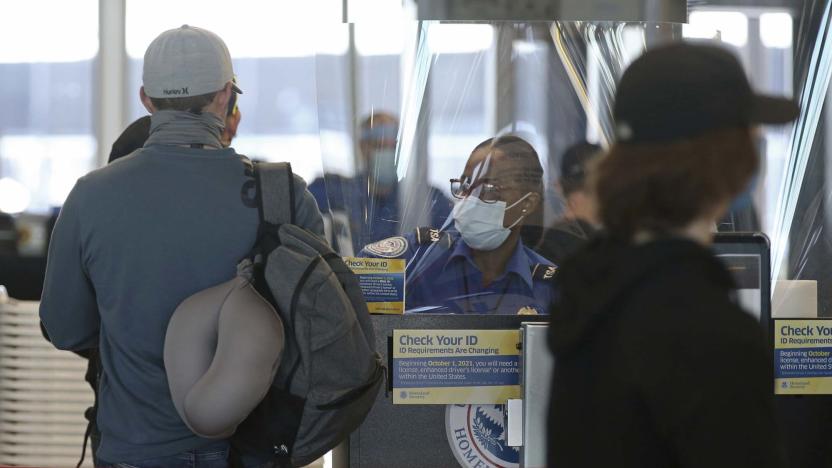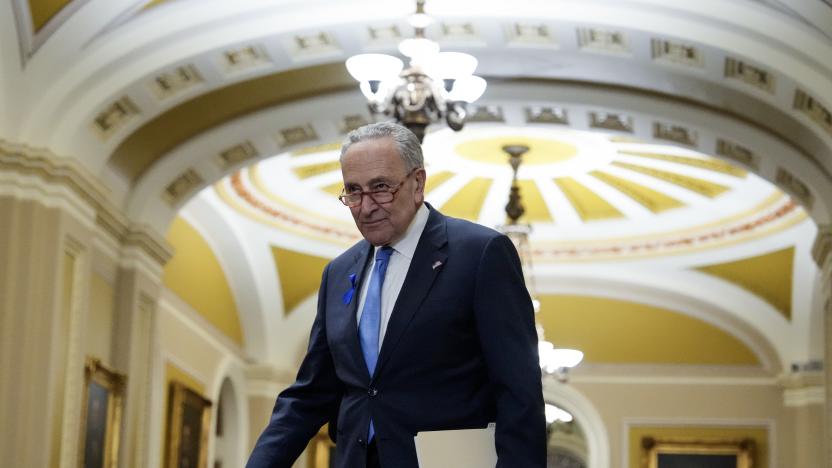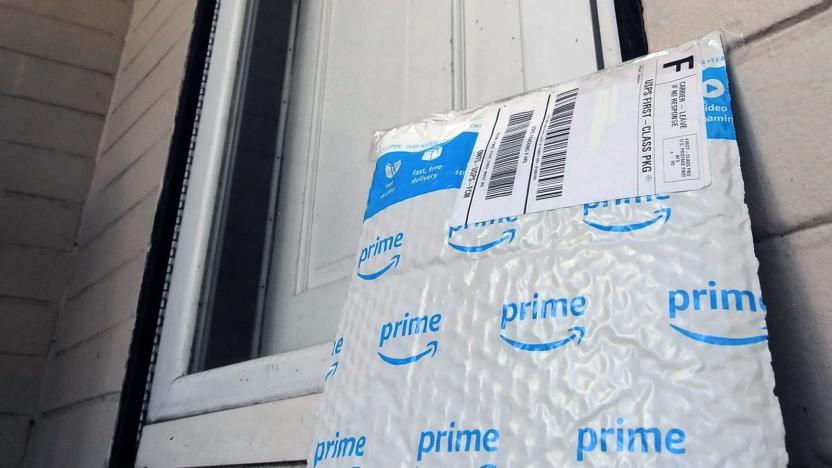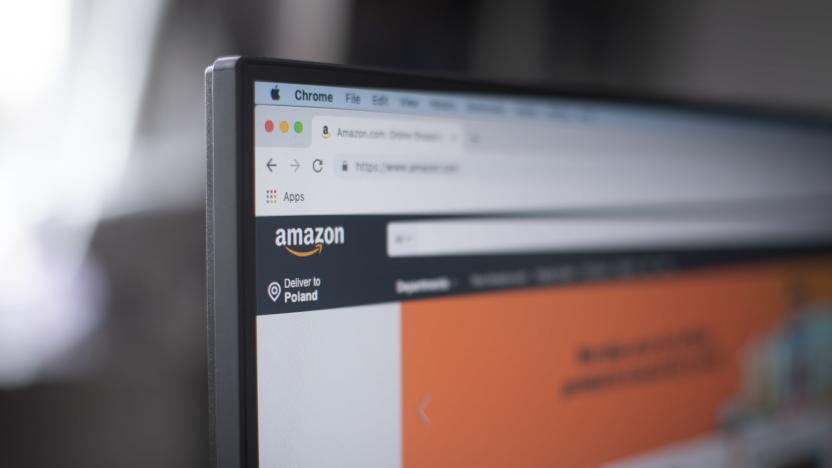us senate
Latest

Bipartisan Senate bill would kill the TSA’s ‘Big Brother’ airport facial recognition
US Senators Jeff Merkley (D-OR) and John Kennedy (R-LA) introduced a bipartisan bill Wednesday to end involuntary facial recognition screening at airports. The legislation would block the Transportation Security Administration (TSA) from continuing or expanding its facial recognition tech program.

The US Senate and Silicon Valley reconvene for a second AI Insight Forum
US Senators, Silicon Valley business and labor leaders once again descended upon Washington DC Tuesday in efforts to guide AI regulation efforts of the transformational technology.

US Senate is the latest to look into Amazon's warehouse safety practices
A US Senate committee is investigating Amazon’s warehouse safety practices. Bernie Sanders (I-VT), Chair of the Senate Health, Education, Labor and Pensions (HELP) Committee, sent a letter to Amazon CEO Andy Jassy today, initiating the probe. Sanders urged Jassy to address health and safety issues at the company’s warehouses and requested additional information about its response to various safety issues.

Senators demand answers from Amazon about unsafe products
A group of three US senators today sent a letter to Amazon CEO Jeff Bezos asking for a "sweeping internal investigation" into the company's consumer safety policies. The letter was written in response to a recent Wall Street Journal investigation that found more than 4,000 items for sale on the retail website that federal agencies had declared unsafe. The products ranged from unregistered pesticides to banned toys that the FDA listed as choking hazards.

Senators want to know why Amazon Choice recommends junk
Amazon has never revealed how products receive its iconic black "Amazon's Choice" label, which gets them top billing on the ecommerce platform. US senators Bob Menendez (D-NJ) and Richard Blumenthal (D-CT) sent a letter today to Amazon CEO Jeff Bezos demanding more details on the elite categorization. The pair raised concerns that the label may be inadvertently tricking consumers into buying inferior products through fraudulent reviews.

Activision hires lobbyists to advocate on Senate bill researching violence
Activision has hired a prominent lobbying group, Akin Gump Strauss Hauer & Feld, to advocate on a Senate bill aimed at researching the impact of "violent" video games and programming on children. The lobbying registration form doesn't indicate Activision's position on the bill. The bill, S. 134: Violent Content Research Act, aims to have the National Academy of Sciences "study the impact of violent video games and violent video programming on children." The study would investigate whether there is a link between violent video games or programming and aggressive behavior. Singular to video games, it would study "whether current or emerging characteristics of video games have a unique impact on children, considering in particular video games' interactive nature and the extraordinarily personal and vivid way violence might be portrayed in such video games." This is a separate effort from President Barack Obama's executive order that the CDC research the causes of gun violence, with a specific mandate to study video games. The Violent Content Research Act was sent to the full Senate on July 30 and has yet to be raised for vote.

PIPA on hold in light of 'legitimate issues raised by many,' says Senate majority leader Harry Reid [update]
It seems that the unending stream of protest from the internet, as well as from the meatspace, have helped to slow -- and potentially stop -- one of the broad reaching anti-piracy acts being proposed for legislation in the US Congress. An upcoming Senate vote on the Protect Intellectual Property Act (PIPA) has been postponed by Senate Majority leader Harry Reid (D-NV).In a press release issued by Reid's office this morning, he cites "legitimate issues" brought up by protesters keeping the bill from being voted on, and calls on PIPA author and Vermont Senator Patrick Leahy to "continue engaging with all stakeholders to forge a balance between protecting Americans' intellectual property, and maintaining openness and innovation on the internet."Reid remains "optimistic" that the Senate will work out any issues with the bill "in the coming weeks," but given the bill's sister act in the house (SOPA) also getting a big delay, we're not similarly optimistic about PIPA's reintroduction. Additionally, Reuters reports that a "senior Democratic aide" speaking on condition of anonymity claimed the act was unable to garner support among the Senate, thus abetting in this delay.Update: House Judiciary Committee Chairman Lamar Smith (R-TX) issued a statement in response to the PIPA announcement, specifically addressing his SOPA bill in the House. "It is clear that we need to revisit the approach on how best to address the problem of foreign thieves that steal and sell American inventions and products." His complete statement can be found here. [ER 09 via Shutterstock]

Senate to vote on net neutrality repeal today, Obama counters with a veto threat (update: 52-46 vote in favor of net neutrality)
The US Senate is slated to vote on a repeal of the FCC's controversial net neutrality regulations today, just a few days before they're scheduled to go into effect. Today's vote, like most these days, is expected to be divided along party lines, with most Democrats standing in favor of the rules, and Republicans calling for them to be overturned. Texas Republican Senator Kay Bailey Hutchinson, who sponsored the resolution, claims that the FCC's regulations would obstruct innovation and investment by jeopardizing the openness upon which the web has thrived, thus far. "The internet and technology have produced more jobs in this country than just about any other sector," Hutchinson argued. "It has been the cradle of innovation, it does not have a problem, and it does not need fixing." Senate Republicans aren't the only ones taking issue with the rules, either. Both Verizon and MetroPCS have already publicly aired their grievances, with the former filing a formal appeal in late September. But Senate Commerce Chairman Jay Rockefeller believes the GOP-led opposition won't be strong enough to overcome his Democratic majority. "There's still 53 of us, and if we stay together we'll win," Rockefeller said. "I think we're going to prevail." Even if they don't, they'll still have the backing of the White House, which has already threatened to veto the resolution, should it survive past the Senate floor. "It would be ill-advised to threaten the very foundations of innovation in the Internet economy and the democratic spirit that has made the Internet a force for social progress around the world," the White House said in a statement, adding that the FCC's rules provide an "effective but flexible" means of preserving the web's intrinsically wild, wild west nature. Rockefeller, however, certainly isn't banking on a presidential veto to bail his party out. "You can take the cheap way out and just say, 'What if we fail, then Obama will veto it,'" he explained. "But that speaks so badly of us." All told, it's shaping up to be another net neutrality showdown on the Hill, but we'll keep you updated on the latest developments. Update: It wasn't an overwhelming victory, but the Senate today rejected the attempt to repeal the FCC's net neutrality rules in a 52 to 46 vote that fell largely along party lines.

US Senate passes patent system reform bill, Obama expected to sign into law
Think it's time to change our patent system? So does Congress. Yesterday, the Senate approved the America Invents Act by an 89-8 vote that could bring about the most drastic changes to the US Patent and Trademark Office (USPTO) in five decades. Under the bill, which the House approved back in June, patents would be awarded not to the first person to invent a technology, but to the first one to actually file with the USPTO, bringing US policy in line with protocol adopted in most other countries. It also calls for a streamlined application process and would allow the USPTO to charge set fees for all apps. The revenue generated from these fees would go directly to a capped reserve fund, allowing the office to retain the lion's share of the money, rather than funneling much of it to Congress, as had become the norm. Supporters say this extra revenue will give the USPTO more power to chip away at its backlog of some 700,000 patent applications, while a new third-party challenge system will help eliminate patents that should've never received approval in the first place. Opponents, meanwhile, criticized the bill for not eliminating fee diversion altogether (an amendment that would've placed more severe restrictions was ultimately killed, for fear that it would jeopardize the bill's passage), with Washington Democratic Senator Maria Cantwell questioning the legislation's impact on small businesses, calling it "a big corporation patent giveaway that tramples on the rights of small inventors." But Senator Patrick Leahy, a Vermont Democrat who sponsored the bill, argued that yesterday's approval marks a major and historic inflection point in US patent policy: The creativity that drives our economic engine has made America the global leader in invention and innovation. The America Invents Act will ensure that inventors large and small maintain the competitive edge that has put America at the pinnacle of global innovation. This is historic legislation. It is good policy. The America Invents Act will now make its way to President Obama's desk, where it's expected to receive his signature. For more background on the legislation, check out the links below.

'Let's Play' videos may soon make you a felon thanks to Senate Bill S.978 [Updated]
[Update: This Is My Next's Nilay Patel has published an extensive break-down of S.978, and it looks like the bill, if passed, wouldn't actually change much of anything for the majority of people who don't profit from their YouTube videos. "Some of the outcry here is a little overblown, as the text of the bill isn't quite as bad as you might think."] Hold on to your butts, Internet, because this party is going to get a whole lot worse before it gets any better. According to Game Informer, a Senate Bill has been introduced which, if passed, would make streaming unauthorized copyrighted material a felony, resulting in up to 5-years of jail time. Bill S.978 states that "10 or more public performances by electronic means, during any 180-day period, of 1 or more copyrighted works" will result in "not more than 5 years" of imprisonment, so long as the performance in question is valued at at-least $2,500 USD, or if the value of a license to legally "perform" the content is valued at $5,000 or more. These are, in essence, the same criteria that allow for DMCA take-down notices to be issued by copyright holders, however jail time and felony status are not currently associated with this particular flavor of copyright infringement. Should this bill jump through all the right hoops, its broadly worded contents could potentially cover everything from homemade gameplay clips (commonly referred to "Let's Play" videos), to fan-made music videos, webcam cover songs, and anything else that involves copyrighted music or video. S.978 could also potentially cover cell-phone videos of concerts and press events, making 13-year-old Beliebers and jaded gaming journalists alike equally in danger of losing their right to vote. If accepted into law, these addenda will be attached to existing copyright laws and will not only apply to YouTube users, but to the sites that embed YouTube content as well. Internet activism group Demand Progress has set up a web-form for those who disagree with the legislation and wish to communicate their displeasure to their local representatives. We would be concerned about the bill's implications as well, but fear not dear reader: the legislation doesn't cover puppet shows as far as we can tell, so Joystiq Playhouse's shadow-kabuki production of Battle Arena Toshinden should still be on track.

'Safe Prisons Communication Act' passes Senate, inmates won't be able to hear you soon
Inmates certainly are industrious folk, relying on pigeons and helicopters and surely the odd baked good or body cavity to smuggle cell phones into prisons. Soon it'll be all for naught, with the Senate unanimously passing the Safe Prisons Communications Act of 2009, allowing prisons to use cellphone jammers. Now the Act will be run over to the House, where we presume it'll flow through with equal expediency. Mind you, cellphone jammer usage outside of jails will continue to be decidedly illegal, meaning activating one could result in your going to jail. Now that would be tragic. [Via textually.org]







